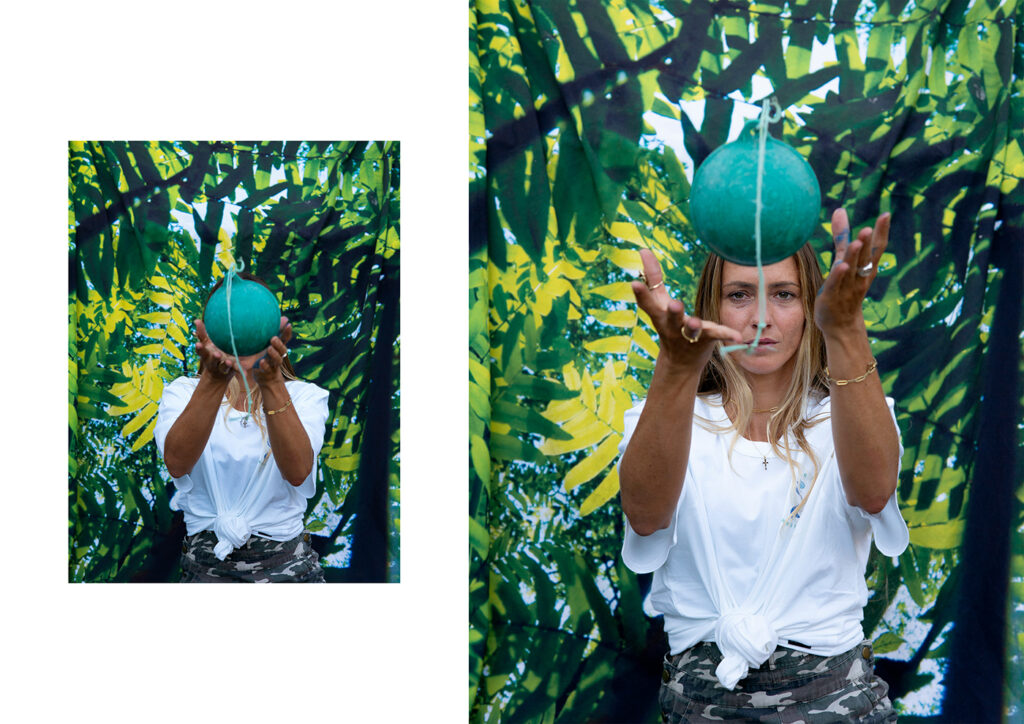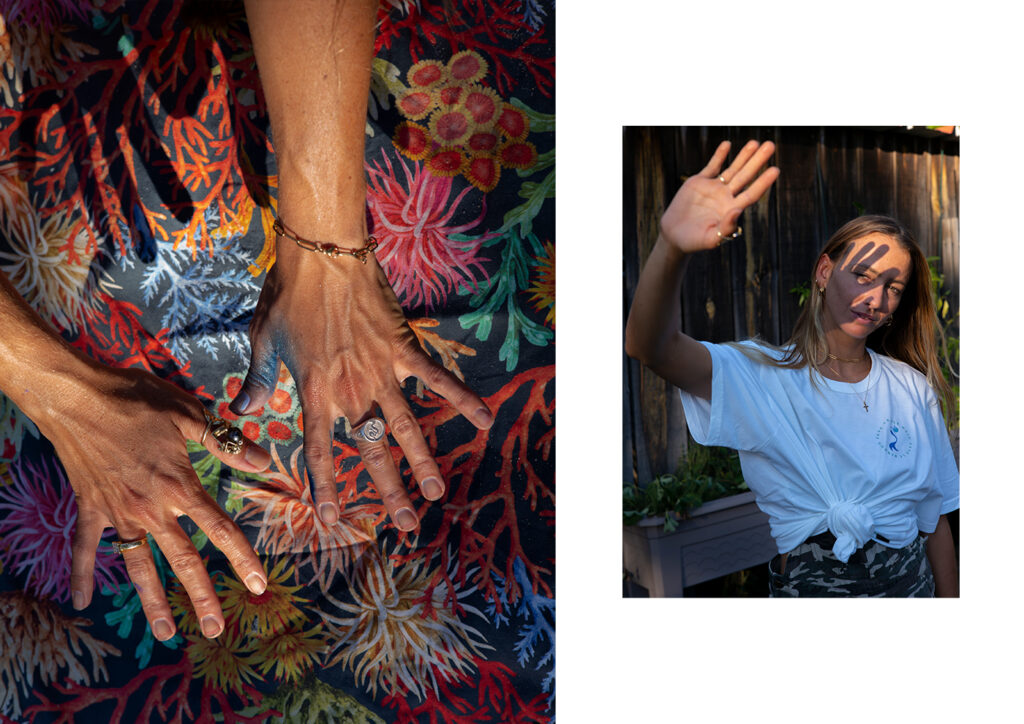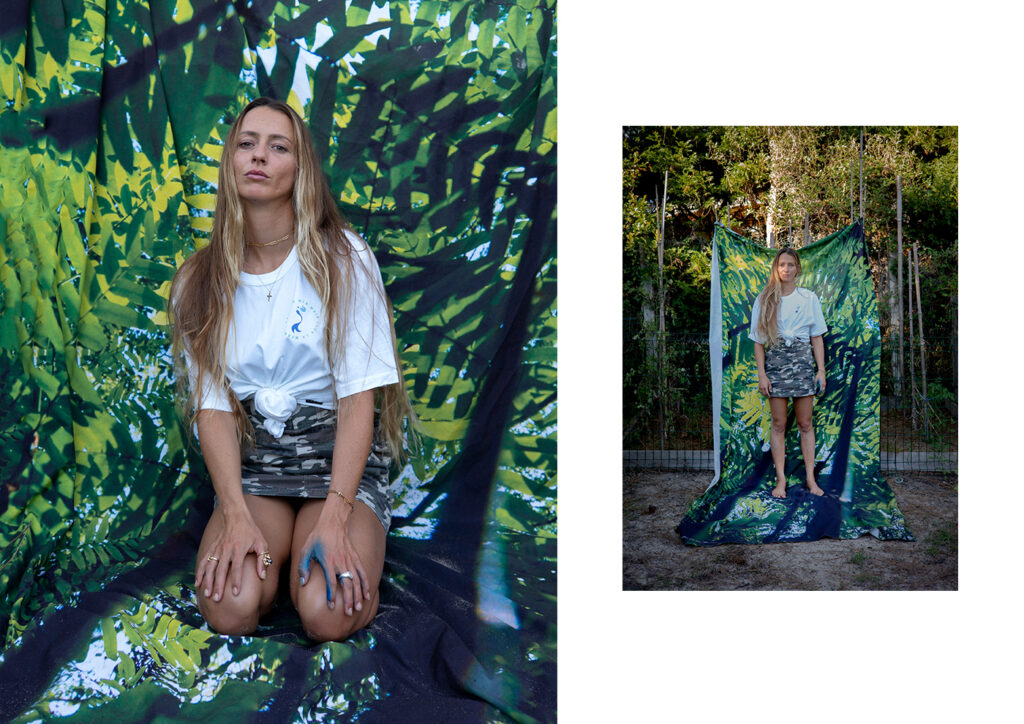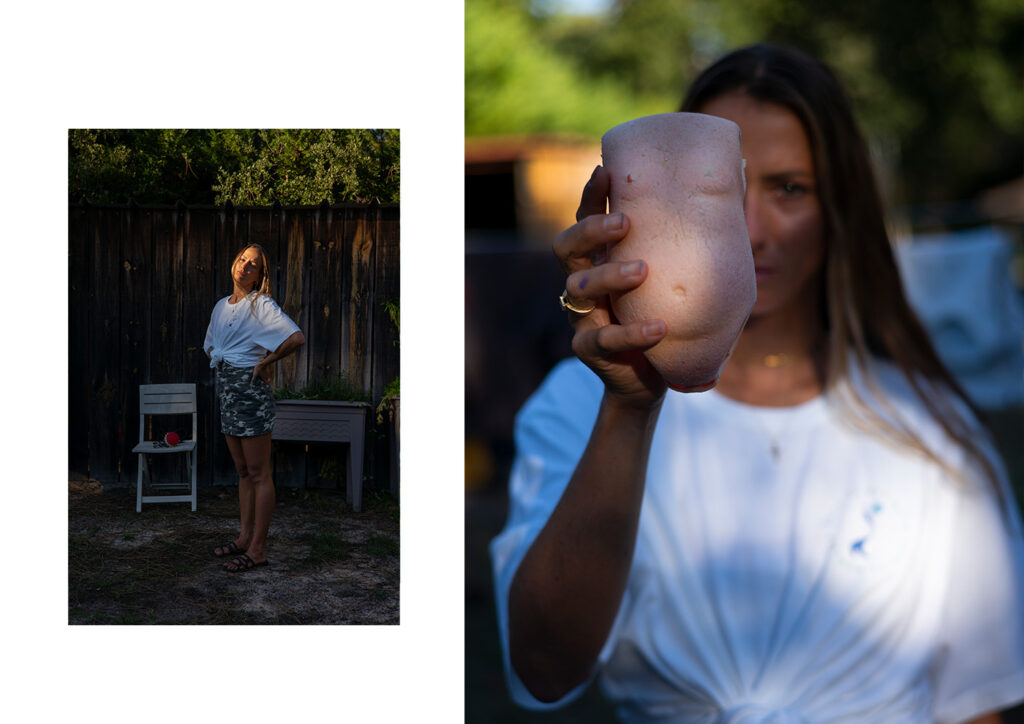As you know, SW France can be surfing heaven or hell. Luckily, the swell gods had been kind to us on the morning of our Maud Le Car interview, and having paddled out in the dark, we were flush with the stoke of scoring a perfect bank before the crowd pushed over the dunes with the rising sun.
Think perfect cylinders catching that first dune-shadowed light as the swell jacked on the sand before spinning off down the line. It was the kind of session where you wanted to be both a photographer and surfer, and your surf exists in the tension between enjoyment and hoping someone else is choosing to shoot.
Maud le Car needs no introduction to the fickle nature of France and was suitably dusted from this mega run of autumnal swell when we sat down with her later that day to catch up.
We kicked-off by inviting her to show her movie at our forthcoming surf film festival tour and discussing how much we enjoyed the premiere of Everywhere I Go, a film project supported by Monster, two years in the making, which explores her journey as a surfer and activist.

Thanks for your time Maud, shall we start with the movie? Which was great, by the way, we really enjoyed watching it. I wanted to ask how the film represents you in terms of your environmentalism, the creation of the Save La Mermaid foundation, and how it represents you regarding your environmental philosophy?
In the film, we really try to represent my three passions: surfing, art, and preservation of the ocean. And we did all this; the canvas with the mermaid using old plastic from the sea represents me. And that was the film’s idea, I’m the mermaid, and it’s a mermaid who tries to keep her habitation safe, just to keep going, keep surfing it, you know, like keep surfing the waves, keep being in the ocean.
We tried in a subtle way to encourage this environmental message, not being super radical with the message, but it’s called Everywhere I Go, so everywhere I go, I do care for the ocean; everywhere I go, I do the best I can to have a better impact on the ocean, and it’s a kind of like chapters in different destinations, and to say that everywhere I go, I have the same love for the ocean. I do my best to have a good impact on the environment and the ocean, which is the basis of the message.
And is approach common in everything that you do in life?
Yeah, in life, I try… I’m not perfect, but I try… No one’s perfect. Yeah, yeah, yeah. And this is really what I want to do also with Save La Mermaid because sometimes I think like ecology, it’s kind of strict and people don’t recognise themselves because it’s so strict. That’s why I created Save La Mermaid, because I’m not perfect, I’m travelling by plane. Sometimes, I buy plastic bottles because I have no choice or no time or whatever and I do not judge people.
I think this is the big difference, making people want to protect the ocean, protect the world and to encourage them and not be judging like, “oh, don’t do this, don’t do that”. No, you do the best you can. If you have a choice between a glass of plastic, you take the glass. You may have no choice, so you refill the plastic and you change your habits. But yeah, I just want to show that we are not perfect; we are encouraging, and I think it makes ecological actions more accessible and cool.

And was there a time in which you realised that you should be actively participating in trying to make everything a bit better? At MSW, we used to sell unsustainable surf brands, which played a role in my creation of a completely plastic-free footwear brand. But with that, we went too natural and perfect, which meant it became challenging to make money.
Yeah, it’s way more expensive to live an ecological life than just buying all the plastic. It’s a contradiction because you buy more things, but it’s less expensive. And when you try to use refills in-store, it’s more expensive to do this than just buy the pasta in plastic. I sometimes just have to look at the extra cost as an investment in the future and the world we live in.
Yeah, and it’s a journey, isn’t it? Sustainable options are often limited, and many of them have their own problems. And while certain brands are greenwashing massively, other brands are on a journey, and they actually intend to head to a better eco place, but to do that is a staged process.
Yeah, step by step, and do the best we can.
And so when you’re purchasing a new pair of shoes or vetting companies who you are working with, are you looking into the supply chains? And how they run their manufacturing?
Oh, how they do it? Yeah. Because surfing is toxic, isn’t it? Do I look, but it’s kind of complicated and if you really want to look into it, you need to have the correct information; sometimes, I don’t know if it’s good information, if it’s something they’re just saying, or is it true? I have no idea, and I’m not in the factory to see what they do, so it’s complicated.
It’s tough now because companies just say whatever they want. Greenwashing is rampant.
Exactly. Even if I go on the website and check, and even if I know the company because I work with them, I am not there in the factory to see from A to Z what’s going on from the creation of the product to the termination. So, I cannot judge just using a website which is just superficial.
What we’d like to do is hold surf a little bit more accountable in terms of what it’s saying vs what it is really doing. Surfers commune with nature, but we do it on petroleum surfboards covered in paraffin wax. With wetsuits it’s getting a bit better with Yulex, but there’s a long way to go.

So, who are you going to for your wetsuits? Because you aren’t with Volcom any more?
Yeah, so I’m not on Volcom because I had to choose, and Dockers is a better opportunity. And I can now choose my wetsuit, and I’m choosing to ride the Sen No Sen wetsuit, a brand from France. It’s made in Bassin d’Arcachon in Bordeaux, and it’s Yulex, which is a good material. So yeah, now I have a choice. I’m like, “okay, I will wear what I want”. And I’m not working with them… I just promote them for free, which I don’t normally do because I generally work with brands as sponsors. But now I can choose; I prefer to go with a local company that makes wetsuits with Yulex. So I’m happy to talk about them, and hopefully, they continue on the right road.
We were at Euro SEMA, and suddenly Yulex is everywhere, most brands had an offering and surfing is saying “oh, maybe we should have a think about this”. We all want to wear a performance wetsuit, and the new Yulex we felt is much improved. What’s your feeling on it as material? When you put it on for the first time, what were you expecting it to be like?
Yeah, I love it. And it’s not that stiff to be honest. It’s pretty good. I heard it’s kind of stiff andso that’s what I expected, and I was surprised. I was like, it’s not even like stiff, like it’s okay. It’s like, it’s a good material.
Moving on to your project, Save La Mermaids, can you tell us a little bit about that? And how you are connecting with the next generation in? The girls you brought to the beach yesterday seemed really involved in what you were doing.
So, what has been nice with Save La Mermaids is that the association brings me super close to the next generation. I’m close to them because I see them in the water; we are all together and it’s always the same lineup of young little girls ripping at all my events.
We were yeah, we should make a team, like let’s be the team mermaid, you’re the representation of the ocean, this is your playground, you are from the team mermaid. And so they were so happy, we created some stickers, and we are team mermaids, so cute. So now I have girls aged from 10 to 15, 16, joining all the events, and they super close to me and for the protection of the ocean.
To be honest, at the start, they were not really there for the protection of the ocean, but because we created this thing, and they were like, “okay, let’s do it”. And now they are super involved in everything. And even the parents, they text me: “oh, it’s so cool, like now she’s taking trash off the beach, and she’s teaching all the family, the grandpas, etc. how to do it”. So it’s super cool, like I’m, wow, it’s an ecological foundation, but it’s, even more, for me, it’s a human foundation, because it gets me closer from the people, from the next generation, and we have those events where we can be free.
Say at a contest, sometimes you’re more focused, and you don’t have the time to speak to people, to take time for them. Whereas at our kind of events, I have all day for the ocean, for them, and we talk and it’s a sharing moment also, so it’s kind of cool. Also I’ve been coaching the girls for the French Cup as Team Mermaid because I am going over there. So I’ll bring them, and they are super happy because we have all those weekend surf camps for mermaids where I can coach them.
But they are like little sisters, and I try to bring them everywhere I have projects or time to surf with them, and it’s good for me, too. They always want to surf, and I might be tired, but they motivate me to get in the ocean and I say, “ok let’s surf again,” but bring your bucket to clean the beach.

Some people think they shouldn’t make small changes because the larger picture is so depressing, and eco-anxiety paralysis is a real thing. I remember a friend saying the only thing you can ever achieve is change within your small circle of influence. You can’t do anything else. You just do your small action and don’t give up.
We need to try to do something. And we all have a little power, you know? Like, we all have a power. It’s just that some people don’t feel concerned. Like, seriously, sometimes I speak with people, and they are not concerned. I’m like, are we living on the same planet? We’re sharing the same planet, and we can create an impact. I’m not saying that we are changing the world, but if we tried, we’d have a bigger impact. Imagine if seven billion people thought they could change the world. We change it. It’s just we are so lazy.
At that point, it’s like Buddhism, isn’t it? In terms of the small actions adding up. Many interconnecting circles of actions creating a more worthwhile place to be. And that’s why I carry on doing stuf, but I still get really sad about our direction of travel.
Yeah, because it’s depressing.
Because they like the products.
Yeah, yeah and because people like plastics.
They like plastic shoes, they like plastic everything.
Because they’re used to it.
Exactly, because they’re used to it and it’s cheap and convenient.
But saying that, we have to change what we are used to and how we do things. It was hard at first when I turned vegan because I was used to eating all other kinds of food. I missed it and thought: “oh, I want some cheese”, but after you get used to it, the desire for cheese disappears. I see it, and I don’t even want it, and I think it’s the same with ecology: you get used to it and after you don’t want to use the plastic products.
So you’ve reprogrammed the circuits in your brain?
Yeah exactly. When you go food shopping, you can take your bags and bring things like small boxes for food.
And so, why did you turn vegan? Was it purely for the planet?
Mainly environmental reasons… Firstly, we all have our own power, and I don’t want to spend my money in the wrong way. People think the big industry controls the world, but we control the world. Because what controls the world is the money. If we don’t give them the money, then those industries will die. So I don’t want to give my money to someone who’s doing bad for the environment, or doing bad for the animals, so this is my way of revolution, my way to say, ok, I turned vegan because I don’t want to give his industry my money, and if we all do the same, the company is going to die, and if the company dies, we win.
My mom always told me when I was super young that if you do something, you do good, or you don’t do it. So, when I do something, I generally try my best. I’m not just going to do an association like Save La Mermaid and not try to do my best every day.
